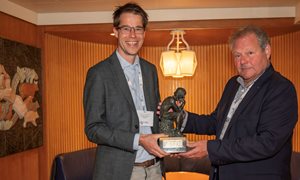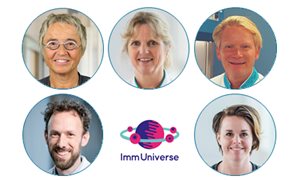18 February 2020
Approximately eight percent of babies in the Netherlands are born prematurely, i.e., before the 37th week of pregnancy. After a premature birth, the baby's brain is still immature and vulnerable, placing the baby at high risk for brain damage. Brain damage also occurs due to a lack of oxygen before, during or after birth, which is the case for 1 in 350 babies in the Netherlands. In life, this brain damage can have far-reaching consequences, such as intellectual disabilities and problems with behavior, emotion and motor skills. There is no treatment available yet to counteract this brain damage.
Stem cells against brain damage
A European consortium led by the French Institut National de la Santé et de la Recherche Médicale (INSERM) will now investigate whether the administration of specific stem cells (mesenchymal stem cells) offers prospects. Radboud university medical center's Department of Laboratory Medicine, Laboratory of Medical Immunology, participates in this significant PREMSTEM research, which has received a total subsidy of more than 9 million euros from the European Union. Irma Joosten, theme Inflammatory diseases: “There are indications that these stem cells can not only repair brain tissue but can also dampen the activity of the immune system. By adjusting the immune system, the damage to the brain may also be limited."
Flexible immune system
In this project, the Laboratory Medicine department, Laboratory of Medical Immunology of the Radboud university medical center does not focus so much on the recovery (regeneration) of brain cells; it will primarily map the dynamics and flexibility of the immune system that result from the administration of stem cells. Medical immunologist Renate van der Molen, project leader, theme Inflammatory diseases: “We specialize in reproductive immunology. Remarkable things happen in the period around the pregnancy. A pregnant woman has an adapted immune system. If not, the child - that consists in part of material of the father - would be rejected, because the material is considered partly foreign to the body. However, it is usually not rejected because the immune system is locally adjusted. This allows the child to grow in the womb for nine months. If something goes wrong in those immunological processes, premature birth can occur. We try very accurately to map the changes and dynamics of the immune system during that period. How does the local immune system in the uterus change, which factors affect it, that sort of thing."
Adjusting
"In this major European project, we are looking very specifically at the changes in the immune system when those mesenchymal stem cells are administered," says Joosten. "We do this in culture trays with human cells, but also in a sheep model for premature birth, for which we are collaborating with the Maastricht UMC, another partner in the project. We also hope to gain more insight into the mechanism of immune regulation during pregnancy, and the eventual prevention of premature birth.
Consortium
The other partners in the research consortium are UMC Utrecht, Maastricht UMC, Universitätsklinikum Essen, Göteborgs Universitet, Consiglio Nazionale delle Ricerche (Rome), Université de Genève, Royal Melbourne Institute of Technology (RMIT) University (Australia and Spain), Iconeus (France) and CHIESI Farmaceutici SPA (Italy), the European Foundation for the Care of Newborn Infants (EFCNI) in Germany, and the Cerebral Palsy Alliance (Australia).

Approximately eight percent of babies in the Netherlands are born prematurely, i.e., before the 37th week of pregnancy. After a premature birth, the baby's brain is still immature and vulnerable, placing the baby at high risk for brain damage. Brain damage also occurs due to a lack of oxygen before, during or after birth, which is the case for 1 in 350 babies in the Netherlands. In life, this brain damage can have far-reaching consequences, such as intellectual disabilities and problems with behavior, emotion and motor skills. There is no treatment available yet to counteract this brain damage.
Stem cells against brain damage
A European consortium led by the French Institut National de la Santé et de la Recherche Médicale (INSERM) will now investigate whether the administration of specific stem cells (mesenchymal stem cells) offers prospects. Radboud university medical center's Department of Laboratory Medicine, Laboratory of Medical Immunology, participates in this significant PREMSTEM research, which has received a total subsidy of more than 9 million euros from the European Union. Irma Joosten, theme Inflammatory diseases: “There are indications that these stem cells can not only repair brain tissue but can also dampen the activity of the immune system. By adjusting the immune system, the damage to the brain may also be limited."
Flexible immune system
In this project, the Laboratory Medicine department, Laboratory of Medical Immunology of the Radboud university medical center does not focus so much on the recovery (regeneration) of brain cells; it will primarily map the dynamics and flexibility of the immune system that result from the administration of stem cells. Medical immunologist Renate van der Molen, project leader, theme Inflammatory diseases: “We specialize in reproductive immunology. Remarkable things happen in the period around the pregnancy. A pregnant woman has an adapted immune system. If not, the child - that consists in part of material of the father - would be rejected, because the material is considered partly foreign to the body. However, it is usually not rejected because the immune system is locally adjusted. This allows the child to grow in the womb for nine months. If something goes wrong in those immunological processes, premature birth can occur. We try very accurately to map the changes and dynamics of the immune system during that period. How does the local immune system in the uterus change, which factors affect it, that sort of thing."
Adjusting
"In this major European project, we are looking very specifically at the changes in the immune system when those mesenchymal stem cells are administered," says Joosten. "We do this in culture trays with human cells, but also in a sheep model for premature birth, for which we are collaborating with the Maastricht UMC, another partner in the project. We also hope to gain more insight into the mechanism of immune regulation during pregnancy, and the eventual prevention of premature birth.
Consortium
The other partners in the research consortium are UMC Utrecht, Maastricht UMC, Universitätsklinikum Essen, Göteborgs Universitet, Consiglio Nazionale delle Ricerche (Rome), Université de Genève, Royal Melbourne Institute of Technology (RMIT) University (Australia and Spain), Iconeus (France) and CHIESI Farmaceutici SPA (Italy), the European Foundation for the Care of Newborn Infants (EFCNI) in Germany, and the Cerebral Palsy Alliance (Australia).
Related news items

Dutch Society of Clinical Chemistry Science & Innovation Award for the team of Hans Jacobs
14 June 2022 The team of Hans Jacobs pioneers on the development of personalized diagnostics to measure minimal residual disease in patients with multiple myeloma. go to page
Joyce Aarts and colleagues published in Scientific Reports about the role of TGF-β1 in (experimental) arthritis
30 March 2022Joyce Aarts, theme Inflammatory diseases, and her colleagues published in Scientific Reports, that local inhibition of TGF-β1 signaling improves Th17/Treg balance but not joint pathology during experimental arthritis.
go to page
New EU Research project ImmUniverse
27 February 2020 In this project (31 mEURO), RIMLS and RIHS researchers collaborate with 25 European partners on dissecting common disease mechanisms of Ulcerative Colitis and Atopic Dermatitis. go to page
It is raining Horizon 2020 grants for RIMLS researchers
15 August 2019 Horizon 2020 is the biggest EU Research and Innovation programme ever with nearly €80 billion of funding available and running from 2014 to 2020. This summer, no less than 8 proposals for the Radboudumc have been accepted, 4 of them even as a coordinator. go to page
Endometrial natural killer cells remember previous pregnancy
11 February 2019 Dorien Feyaerts, theme Inflammatory diseases, showed that pregnancy induces a memory phenotype on endometrial natural killer cells. However, previous CMV infection is a prerequisite for this memory induction. They published their findings in Cellular and Molecular Immunology. go to page